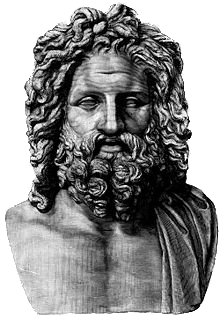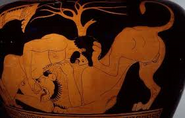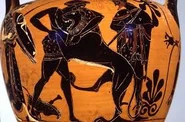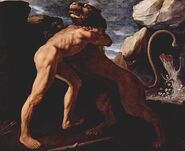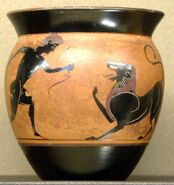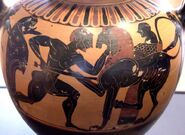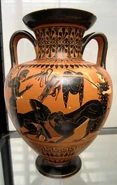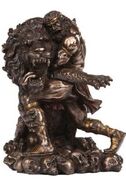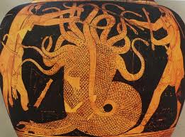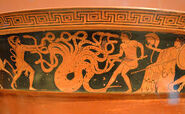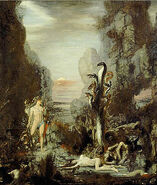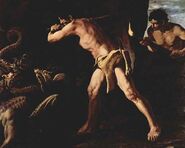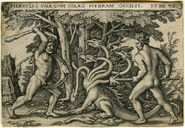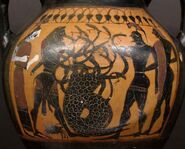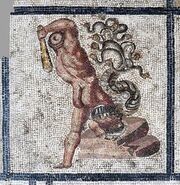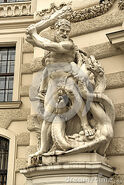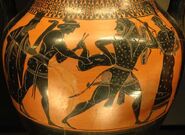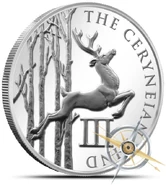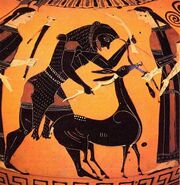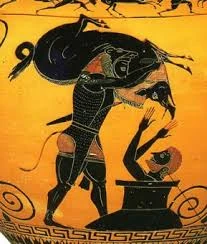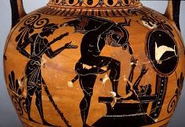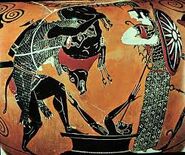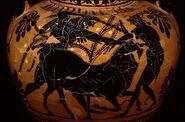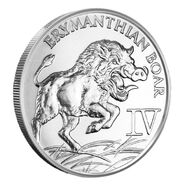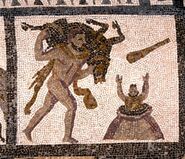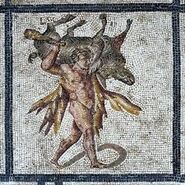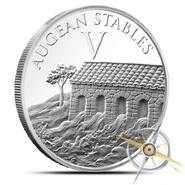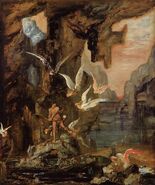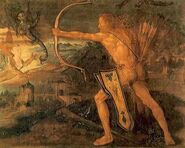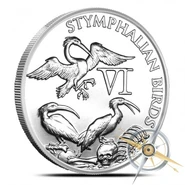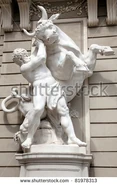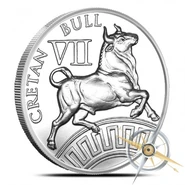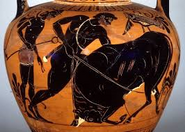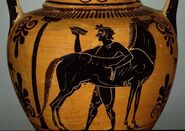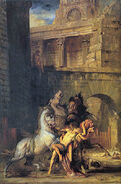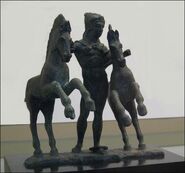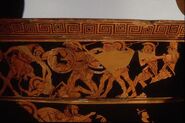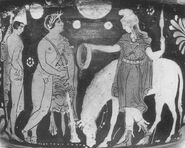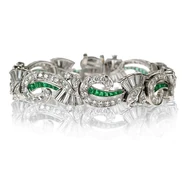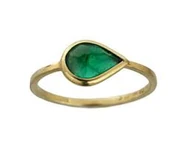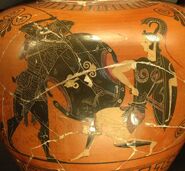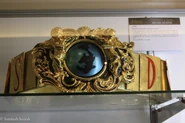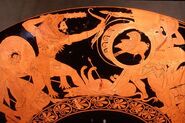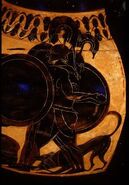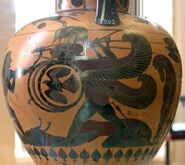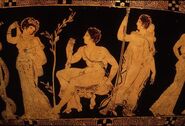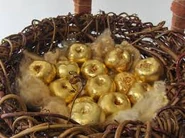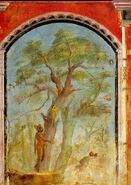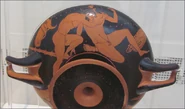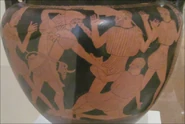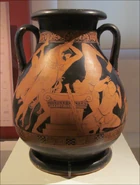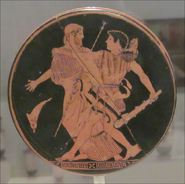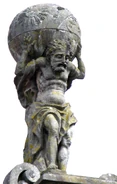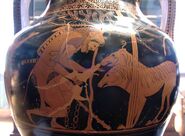After he murdered his wife and children, Herakles, or Hercules, sought to be punished, so he may be pure again. Therefore, he was first given ten tasks. Technically, Heracles did twelve, but since in Heracles' Second Labor he had help from his friend Iolaus who seared the stumps of the Hydra's neck one of the labors, Aristaeus claimed it is not considered a task. Therefore, Heracles had to do something else ne more to make up for the one he "cheated" on. As for the fifth labor Herakles was promised one tenth of Augeas' Cattle if he could complete the task in one day. When Herakles succeeded Augeas claimed that Herakles was doing a job for Aristaeus so the agreement was moot. When Aristaeus learned that an agreement had been made between Herakles and Augeas which Herakles would have profited from Aristaeus refused to count it (the fact that Augeas did not pay was in Arisiaeus' mind irrelevant) so he had to make that up as well.
The First Labor: Slay the Nemean Lion
The Nemean Lion known as Leon Nemeios (Λεον Νεμειος), was the son of the monster Ekhidna, it dwelled in Nemea, north of Argus. The lion was said to be bigger than Heracles, could not be harmed by any weapon. He used to emerge from two openings in his cave and destroy anything and anyone who stood in his way, and terrorized the nearby valleys. As a first task, Aristeaus told Heracles to bring him the skin of the Nemean Lion.
Herakles climbed the mountain, passed the bushes and at twilight he found the lion. Herakles took his bow and shot the lion. Since no weapons could harm it, the arrow fell to the ground as the lion did not even notice it. Heracles shot an arrow to the monster's chest, but of no avail. But that last arrow fell between the Lion's feet and he noticed Hercules, and jumped toward him. The demigod tried to hit its head with a olive wood branch, but it only misted the Lion's eyes and it retreated back to its lair.
Herakles used his enemy's blindness, and blocked the rear entrance of the cave, and stormed through the front, there he found the lion. The hero jumped on the beast's back, and since he could not harm it with weapons, he suffocated it to death. Using the dead Lion's own claws, he opened its body and made a mantal from the skin. He wore it ever since.
Returning with the pelt to the capital city, his uncle was so afraid of Heracles' mighty power he ordered him to never enter the capital with the evidence of his labors, and gave his nephew tasks using a messenger.
The Second Labor: Slay the Lernean Hydra
The Lernaean Hydra (Λερναιαν Ὑδρα), another child of Echidna, was a terrifying beast, which lived near Amimona river, and bathed in the deep swamps nearby. It had nine heads of a serpent and a body of a dog. With its deadly venomous spit, it killed animals and destroyed crops. Heracles was told to slay the Hydra, and came to her home by a chariot driven by Iolaus, his nephew. The demigod fired burning arrows into its lair to call the Hyra out, but to his surprise, both the Hydra and another beast came out. It was a giant crab sent by Hera, so Heracles may find his death. Coming out of the mud, the crab bit Heracles' leg, trying to make him fall. Heracles crushed the crab with his heel, but was trapped by the Hyra. Herakles tried to behead the Hydra, but whenever a head was cut off, two others grew instead. Seeing Heracles failing to cut off the Hydra's heads, Iolaus burned a branch of a nearby tree, and whenever a head was chopped, he burned it so another may not grow. At the end, only one head remained, but it was immortal, so Heracles took a rock and buried the head underneath. Returning to the city, Aristaeus claimed since Herakles had Iolaus as an assistance, it was not to be considered a task.
The Third Labor: Capture the Golden Hind of Artemis
Eurystheus and Hera were greatly angered to find that Heracles had managed to escape from the claws of the Nemean Lion and the fangs of the Lernaean Hydra, and so decided to spend more time thinking up a third task that would spell doom for the hero. The third task did not involve killing a beast, as it had already been established that Heracles could overcome even the most fearsome opponents, so Eurystheus decided to make him capture the Kerynitian Hind, as it was so fast it could outrun an arrow.
After beginning the search, Heracles awoke from sleeping and he could see the hind from the glint on its antlers. Heracles then chased the hind on foot for a full year through Greece Thrace, Istria and the land of the Hyperboreans. In some versions, he captured the hind while it slept, rendering it lame with a trap net. In other versions, he encountered Artemis in her temple and she told him to leave the hind and tell Eurystheus all that had happened and his third labor would be considered to be completed. Yet another version claims that Heracles trapped the Hind with an arrow between the forelegs of the creature.
Eurystheus had given Heracles this task hoping to incite Artemis' anger at Heracles for his desecration of her sacred animal. As he was returning with the hind, Heracles encountered Artemis and her brother Apollo. He begged the goddess for forgiveness, explaining that he had to catch it as part of his penance, but he promised to return it. Artemis forgave him, foiling Eurystheus' plan to have her punish him.
Upon bringing the hind to Eurystheus, he was told that it was to become part of the King's menagerie. Heracles knew that he had to return the hind as he had promised, so he agreed to hand it over on the condition that Eurystheus himself come out and take it from him. The King came out, but the moment Heracles let the hind go, it sprinted back to its mistress, and Heracles left saying that Eurystheus had not been quick enough. Eurystheus, upset that Heracles had managed to overcome yet another creature, told him to bring the fearsome Erymanthian Boar back to him alive.
The Fourth Labor: Capture the Erymanthian Boar
Hercules' fourth labour—by some counts, for there is no single definitive telling—was to capture the Erymanthian Boar. On the way there, Hercules visited Pholus ("caveman"), a kind and hospitable centaur and old friend. Hercules ate with him in his cavern—though the centaur devoured his meat raw—and asked for wine. Pholus had only one jar of wine, a gift from Dionysus to all the centaurs on Mt. Erymanthos. Heracles convinced him to open it, and the smell attracted the other centaurs. They did not understand that wine needs to be tempered with water, became drunk, and attacked. Heracles shot at them with his poisonous arrows, and the centaurs retreated all the way to Khiron's cave.
Pholus was curious why the arrows caused so much death, and picked one up but dropped it, and the arrow stabbed his foot, poisoning him. One version states that a stray arrow hit Chiron as well, but Chiron was immortal, although he still felt the pain. Chiron's pain was so great, he volunteered to give up his immortality, and take the place of Prometheus, who had been chained in to the top of a mountain to have his liver eaten daily by an eagle, although he was an immortal Titan. Prometheus' torturer, the eagle, continued its torture on Chiron, so Heracles shot it dead with an arrow. It is generally accepted that the tale was meant to show Heracles as being the recipient of Chiron's surrendered immortality. However, this tale contradicts the fact that Chiron later taught Akhilles. The tale of the Centaurs sometimes appears in other parts of the twelve labours, as does the freeing of Prometheus.
Heracles had visited Chiron to gain advice on how to catch the boar, and Chiron had told him to drive it into thick snow, which sets this Labour in mid-winter. Having successfully caught the Boar, Heracles bound it and carried it back to Eurystheus, who was frightened of it and ducked down in his half-buried storage pithos, begging Heracles to get rid of the beast, a favorite subject for the vase-painters. Heracles obliged. Roger Lancelyn Green states in his Tales of the Greek Heroes that Heracles threw it in the sea. It then swam to Italy, where its tusks were preserved in the Temple of Apollo at Cumae. Three days later, Eurystheus, still trembling with fear, sent Heracles to clean the Augean stables.
Aside from the boar that killed Adonis, the other most celebrated boar in Greek myth was the Calydonian boar, who was killed by Meleager.
The Fifth Labor: Clean the Augean Stables
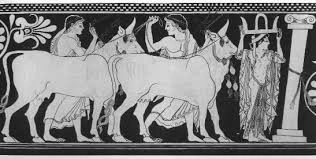
Herakles in the process of cleaning The Augean Stables
The fifth Labour of Heracles] was to clean the Augean Stables. This assignment was intended to be both humiliating (rather than impressive, as had the previous labours) and impossible, since the livestock were divinely healthy and therefore produced an enormous quantity of cow dung. These stables had not been cleaned in over 30 years, and over 1,000 cattle lived there. However, Heracles succeeded by rerouting the Alfeios River and the Pineios River (Peloponnese) Peneus to wash out the filth.
Augeas was irate because he had promised Heracles one tenth of his cattle if the job was finished in one day. He refused to honour the agreement, and Heracles killed him after completing the tasks. Heracles gave his kingdom to Augeas' son Phyleus, who had been exiled for supporting Heracles against his father.
According to the Odes of the poet Pindar, Heracles then founded the Olympic Games:
| “ | the games which by the ancient tomb of Pelops the mighty Heracles founded, after that he slew Kleatos, Poseidon's godly son, and slew also Eurytos, that he might wrest from tyrannous Augeas against his will reward for service done.[7] | ” |
The success of this labour was ultimately discounted because the rushing waters had done the work of cleaning the stables and because Heracles was paid. Eurystheus, stating that Heracles still had seven Labours to do, then sent Heracles to defeat the Stymphalian Birds.
The Sixth Labor: Rid the Island Stymphalos of the Man-eating Birds
After cleaning the Augean Stables, Eurystheus sent Herakles to defeat the Stymphalian Birds. Heracles could not go too far into the swamp, for it would not support his weight. Athena, noticing the hero's plight, gave Heracles a set of castanets which had made especially for the occasion. Heracles shook the Castanets and frightened the birds into the air (other versions of the story say that Herakles was given a pair of symbols which he banged loudly). Heracles then shot many of them with his arrows. The rest flew far away, never to return. The Argonauts would later encounter them. Heracles then brought some of the birds he had killed to Eurystheus. He then sent Heracles to capture the Cretan Bull] and bring it to him.
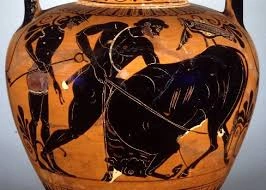
Cretan Bull
The Seventh Labor: Capture the Kretan Bull
Whistling merrily at his success so far, Heracles was then sent to capture the bull by Eurystheus as his seventh task. He sailed to Krete, whereupon the King, Minos, gave Heracles permission to take the Kretan Bull away and offered him assistance, which Heracles denied because of pride, as it had been wreaking havoc on Krete by uprooting crops and leveling orchard walls. Heracles snuck up behind the bull and then used his hands to strangle it, and then shipped it back to Athens. Eurystheus, who hid in his Pithos at first sight of the creature, wanted to sacrifice the bull to Hera, who hated Heracles. She refused the sacrifice because it reflected glory on Heracles. The bull was released and wandered into Marathon, becoming known as the Marathonian Bull. Theseus would later sacrifice the bull to Athena and/or Apollo. Eurystheus then sent Heracles to bring back the man-eating Mares of Diomedes.
One of the Mares of Diomedes
The Eight Labor: Steal the Men Eating Mares of Diomedes
After capturing the Kretan Bull, Heracles was to steal the Mares of Diomedes. In one version of the story, Heracles brought a number of youths to help him. They took the mares and were chased by Diomedes and his men.
Heracles was not aware that the horses, called Podagros (the fast), Lampon (the shining), Xanthos (the blond) and Deinos (the terrible), were kept tethered to a bronze manger because they were wild; their madness being attributed to an unnatural diet of human flesh. In some versions say that they expelled fire when they breathed. They were man-eating and uncontrollable, and Heracles left his favoured companion, Abderus, in charge of them while he fought Diomedes, and found out that the boy was eaten. In revenge, Heracles fed Diomedes to his own horses, then founded, Thrace Abdera next to the boy's tomb.
In another version, Heracles stayed awake so that he didn't have his throat cut by Diomedes in the night, and cut the chains binding the horses. Having scared the horses onto the high ground of a peninsula, Heracles quickly dug a trench through the peninsula, filling it with water, thus making it an island. When Diomedes arrived, Heracles killed him with an axe (the one used to dig the trench), and fed the body to the horses to calm them.
Both versions have eating make the horses calmer, and Heracles took the opportunity to bind their mouths shut, and easily took them back to King Eurystheus, who dedicated the horses to Hera. In some versions, they were allowed to roam freely around Argos, having become permanently calm, but in others, Eurystheus ordered the horses taken to Olympus to be sacrificed to Zeus, but Zeus refused them, and sent wolves, lions, and bears to kill them. Roger Lancelyn Green] states in his Tales of the Greek Heroes that their descendants were used in the Trojan War. After the incident, Eurystheus sent Heracles to bring back Hippolyta's Girdle.
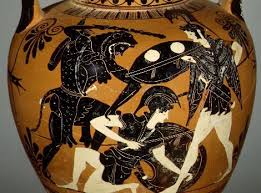
Retrieving Hippolyta's Girdle
The Ninth Labor: Obtain the Girdle of Hippolyta, Queen of the Amazons
Hippolyta appears in the myth of Heracles. He was sent to obtain the Girdle of Hippolyta It was her girdle that Heracles was sent to retrieve for Admeta, the daughter of king Eurystheus, as his ninth labor.
When Heracles landed the Amazons originally were reserved and did not received him warmly. However Herakles performed a feet of great strength and won them over. Upon hearing his request, she agreed to let him take the girdle. Hera, however, was not pleased, as was often the case with Heracles. The fact that Herakles won the Amazons over so easily and thus acquired the Girdle with ease, Hera was upset. Hera took action to stop him, she came down to the Amazons disguised as one of their own and ran through the land, crying that Heracles meant to kidnap their queen. Probably remembering all too well what Theseus had done, the Amazons charged toward the ship to save Hippolyta. Fearing that Hippolyta had betrayed him, Heracles kissed her briefly then hastily killed her, ripped the girdle from her lifeless body, and set sail, narrowly escaping the raging warriors.
An alternate story of Hippolyta's death involved her sister, Penthesilea. Penthesilea had killed Hippolyta with a spear by accident when they were hunting deer; this accident caused Penthesilea so much grief that she wished only to die, but, as a warrior and an Amazon, she had to do so honorably and in battle. She therefore was easily convinced to join in the Trojan War, fighting on the side of Troy's defenders, where she was killed by Akhilleus, who almost immediately afterward regretted doing so.
The Tenth Labor: Obtain the Cattle of the Giant Geryon
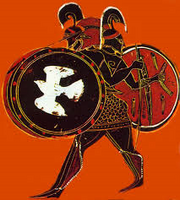
Three Bodied Geryon
In the fullest account in the Bibliotheke of Pseudo-Apollodoros, Heracles was required to travel to Erytheia, in order to obtain the Cattle of Geryon as his tenth labour. On the way there, he crossed the Ancient Libyan] desert and became so frustrated at the heat that he shot an arrow at Helios, the Sun. Helios "in admiration of his courage" gave Heracles the golden cup he used to sail across the sea from west to east each night. Heracles used it to reach Erytheia, a favorite motif of the Black-figure pottery vase-painters. Such a magical conveyance undercuts any literal geography for Erytheia, the "red island" of the sunset.
When Heracles reached Erytheia, no sooner had he landed than he was confronted by the two-headed dog, Orthrus. With one huge blow from his olive-wood club, Heracles killed the watchdog. Eurytion the herdsman came to assist Orthrus, but Heracles dealt with him the same way.
On hearing the commotion, Geryon sprang into action, carrying three shields, three spears, and wearing three helmets. He pursued Heracles at the River Anthemus but fell victim to an arrow that had been dipped in the venomous blood of the Lernaean Hydra, shot so forcefully by Heracles that it pierced Geryon's forehead, "and Geryon bent his neck over to one side, like a poppy that spoils its delicate shapes, shedding its petals all at once".
Heracles then had to herd the cattle back to Eurystheus. In Roman versions of the narrative, on the Aventine hill in Italy, Kakos stole some of the cattle as Heracles slept, making the cattle walk backwards so that they left no trail, a repetition of the trick of the young Hermes. According to some versions, Heracles drove his remaining cattle past a cave, where Cacus had hidden the stolen animals, and they began calling out to each other. In others, Caca, Cacus' sister, told Heracles where he was. Heracles then killed Cacus, and according to the Romans, founded an altar where the Forum Boarium was, the cattle market, was later held.
To annoy Heracles, Hera sent a gadfly to bite the cattle, irritate them and scatter them. The hero was within a year able to retrieve them. Hera then sent a flood which raised the level of a river so much, Heracles could not cross with the cattle. He piled stones into the river to make the water shallower. When he finally reached the court of Eurystheus, the cattle were sacrificed to Hera.
In the Aeneid, Virgil may have based the triple-souled figure of Erulus, king of Praeneste, on Geryon. The Herculean Sarcophagus of Genzano features a three headed representation of Geryon.
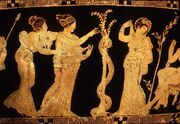
The Garden of the Hesperides
The Eleventh Labor: Steal the Apples of the Hesperides
After Herakles completed his first ten Labors of Hercules Labors, Eurystheus gave him two more claiming that neither the Hydra counted (because Iolaus helped Heracles) nor the Augean stables (either because he had been promised payment for the job or because the rivers did the work). The first of these two additional Labours was to steal the apples from the Garden of the Hesperides. Heracles first caught the Old Man of the Sea, the shape-shifting sea god, to learn where the Garden of the Hesperides was located.
In some variations, Heracles, either at the start or at the end of his task, meets Antaeus, who was invincible as long as he touched his mother Gaia,the earth. Heracles killed Antaeus by holding him aloft and crushing him in a bearhug.
Herodotus claims that Heracles stopped in Egypt, where King Busiris decided to make him the yearly sacrifice, but Herakles burst out of his chains. Hercules stealing the golden apples from the Garden of the Hesperides. Detail of a Roman mosaic from Llíria, Spain (3rd century). Finally making his way to the Garden of the Hesperides, Heracles tricked Atlas into retrieving some of the golden apples for him, by offering to hold up the heavens for a little while (Atlas was able to take them as, in this version, he was the father or otherwise related to the Hesperides). This would have made this task - like the Hydra and Augean stables - void because he had received help. Upon his return, Atlas decided that he did not want to take the heavens back, and instead offered to deliver the apples himself, but Herakles tricked him again by agreeing to take his place on condition that Atlas relieve him temporarily so that Heracles could make his cloak more comfortable. Atlas agreed, but Heracles reneged and walked away, carrying the apples. According to an alternative version, Heracles slew Ladon instead.
There is another variation to the story where Herakles was the only person to steal the apples, other than Perseus, although Athena later returned the apples to their rightful place in the garden. They are considered by some to be the same "apples of joy" that tempted Atalanta, as opposed to the "Apple of Discord" used by Eris to start a beauty contest on Olympus (which caused The Trojan War).
On Attic pottery, especially from the late fifth century, Heracles is depicted sitting in bliss in the Gardens of the Hesperides, attended by the maidens.
The Twelfth Labor: Capture and bring back Kerberos

Herakles showing King Eurystheus his capture of Kerberos
Capturing Kerberos alive, without using weapons, was the final labour assigned to Heracles (Hercules) by King Eurystheus, in recompense for the killing of his own children by Megara after he was driven insane by Hera, and therefore was the most dangerous and difficult. In the traditional version, Heracles would not have been required to capture Cerberus, however Eurystheus discounted the completion of two of the tasks as Heracles had received assistance.
After having been given the task, Heracles went to Eleusis to be initiated in the Eleusinian Mysteries so that he could learn how to enter and exit the underworld alive, and in passing absolve himself for killing centaurs. He found the entrance to the underworld at Tanaerum, and Athena and Hermes helped him to traverse the entrance in each direction. He passed Charon with Hestia's assistance and his own heavy and fierce frowning.
Whilst in the underworld, Heracles met Theseus and Pirithous. The two companions had been imprisoned by Hades for attempting to kidnap Persephone. One tradition tells of snakes coiling around their legs then turning into stone; another that Hades feigned hospitality and prepared a feast inviting them to sit. They unknowingly sat in chairs of forgetfulness and were permanently ensnared. When Heracles had pulled Theseus first from his chair, some of his thigh stuck to it (this explains the supposedly lean thighs of Athenians), but the earth shook at the attempt to liberate Pirithous, whose desire to have the wife of a god for himself was so insulting he was doomed to stay behind.
Heracles found Hades and asked permission to bring Cerberus to the surface, which Hades agreed to if Heracles could overpower the beast without using weapons. Herakles was able to overpower Kerberos and proceeded to sling the beast over his back, dragging it out of the underworld through a cavern entrance in the Peloponnese and bringing it to Eurystheus. The king was so frightened of the beast that he jumped into a Pithos, and asked Heracles to return it to the underworld in return for releasing him from his labors.
Other Feats and Adventures
- Heracles slew wild centaurs.
- He defeated the gods, Thanatos, Ares, Apollo, Hades, Hera and Achelous.
- Heracles slew the fire-breathing giant, Cacus.
- Slew the Trojan Sea Monster.
- He was the first person to sack Troy. Heracles also sacked many kingdoms and tribes, including Sparta, Pylos, Mysia etc.
- Heracles slew the Giant sons of Poseidon: Antaeus, Albion and Bergion. He also slew many demigod sons of Poseidon.
- Heracles defeated the siamese twins, the Dolopes.
- Heracles slew many kings and princes, most notably Periclymenus, who could turn into any animal.
- Heracles fought alongside the gods in the Giant War. He killed Alcyoneus and Porphyrion.
- He invented Pankration.
